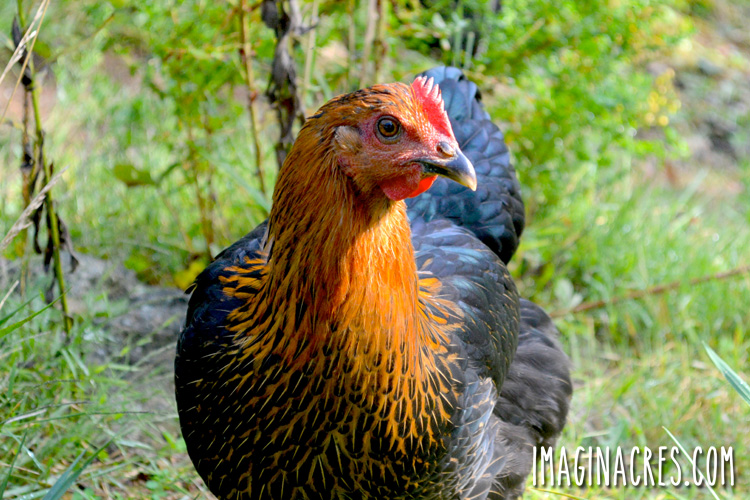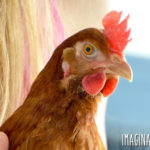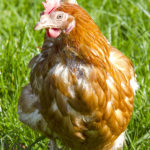Before you let your chickens free range, it is a good idea to have a strategy to get them back into their pen. Here are tips to train your chickens to come when called.
One of the most hilarious things to witness is a flock of chickens running towards you when you call. The flap their wings, roll their bodies, and run as fast as their little feet can carry them. It makes me laugh every time.

We have lots of predators in our area making it unsafe for the girls to be in the yard on their own. Instead, I let the flock out for supervised free ranging after dinner.
I take this opportunity to clean the coop, work in the garden, or do other outside chores nearby where I can keep an eye on the girls in the yard. Our dog also patrols the yard and deters foxes from coming near.
When it is time to go in, I simply call my flock and get them back into their pen.

Early on, I trained my chickens to come to the sound of shaking a container of sunflower seeds. That’s my, “call.” The noise of the sunflower seeds shaking in the jar is enough to grab their attention and get them to come to me.
The only time they get sunflower seeds is when I want them to go back into their pen.
When I shake the jar of sunflower seeds, the hens come running from all corners of the yard. I give them a handful or two, and then walk to the door of the pen.
They follow quickly and some even run into the pen knowing that is where I will toss the next few handfuls.
Once they are all in the pen, I simply close and lock the door and toss in a few more handfuls of sunflower seeds.
Reasons you want chickens to come when called
There are many circumstances when it is important to get your flock to hurry back to their secure pen:
- Predator spotted in the area: You may have spotted a fox or hawk nearby and want the flock to return to safety quickly. Once your chickens are trained to come, they will respond even when you are in a panic. You can get them back to the protection of their pen quickly.
- Bad weather rolling in: If the weather turns bad or there is a storm on the horizon, it is important to get the flock and yourself to safety. Calling your chickens is the easiest way to get them home quickly.
- Free range time is over: Chickens will instinctively return to the coop to roost around dusk, but sometimes you need them home earlier. Once your flock is trained to come when you call, it will be easy to get them back to their pen when free range time is over.
How to Teach Chickens to Come When Called
It is pretty easy to train chickens to come running when the reward is a tasty treat. Decide what delicacy will work to entice your chickens and follow these steps to train them to come when called:
Step 1: Start training in a protected, fenced in area
Put up a temporary fence and let your chickens out of their pen into the enclosed area. Allow the flock to explore and peck for a while. We used a roll of livestock fencing, but you may want to invest in an electrical portable fence if you plan on moving the enclosed area to different parts of your yard.
Sit calmly with your chickens and talk with them. Your flock already sees you as the source of good things, the bringer of food, water, and treats. Chickens are very social creatures and spending time with them will help you further build trust.

Step 3: Decide what you will use for your call
Choose your “call.” It can be a word, phrase, or sound. Whatever you choose, be consistent and use the same thing each time. If it is a word or phrase, say it in the same way each time, such as, “Here! Chick! Chick!” or “Come on Girls!”
My call is shaking a container of sunflower seeds while calling, “Chickiedos!”
Step 3: Establish a connection between the call and reward
Choose a tasty treat for the chickens. You can use mealworms, sunflower seeds, unsalted pumpkin seeds, cracked corn, or whatever safe treat your flock goes crazy over.
Make the call and reward the chickens that come to you. No one wants to miss out on a tasty treat. The rest of the flock will soon take notice and follow. To reinforce the connection, keep calling your chickens and rewarding them as they come.
When I want my hens to come to me, I begin shaking the container of sunflower seeds and calling, “Chickiedos!” When each chicken reaches me, I talk with them and sprinkle seeds for them to eat. I continue to shake the container to encourage the others to follow.

Step 4: Lead the flock to their pen
Now that you have your chicken’s attention, and they are gathered around you, encourage the birds to follow you. Reward them along the way to keep them following you. Once in a while one or two will begin to wander off, call them back, and reward them again.
Toss a few treats into the pen and the chickens will follow. Close the door and reward them with a few more handfuls.

Step 5: Repeat the process each day
The following day, repeat steps 1-4. Do this each day until you feel confident that your girls are responding quickly to your call and following you into their pen.
Step 6: Expand their free range area
Once you are assured that your flock is trained to come, expand their free range area. Depending on the safety of your yard, remove the temporary fence and let them free range in a larger area. Be mindful of predators in your area and the safety of your flock.
Call them and get them back to their pen when free range time is over.

That’s it! Now your birds will come when called and will follow you wherever you lead. Some may even go directly to the pen because they know they will be rewarded there. Encourage this behavior by rewarding with treats.
Once and a while you may have a stubborn hen who suddenly decides not to stick to routine. This usually happens to my flock in fall when molting begins. If one member of the flock decides to be a jerk, others may join her. It is no fun trying to chase chickens around the yard. See The Great Chicken Caper.
When this happens, I suspend free range time for a few days and things usually go back to normal. If this continues to be a problem, consider re-training from step 1.
—
Do you free range your chickens? How do you get them to come home? Let us know in the comments.
Related Posts





This is such a handy lesson to teach your chickens! I have some young ones that aren’t too interested in coming in, no matter what…they just want to have fun. 🙂
But they are slowly getting the idea that I have treats for the good little chickies, lol!
Lisa, Once they learn that you have treats, they will follow you anywhere!
Great post! This is a really nice training method for anyone beginning to free range their chickens. Your pinterest post caught my attention, which I shared there and then came here to read the full article. Nice job!
I really enjoy incubating and raising my own baby chicks. I watch them break out of the shell. Something had my rooster for their dinner not long ago. He was so pretty and such a nice rooster. I will have to buy another one in the spring. Our farm store always has baby chicks in the spring. I am trying to learn how to sex baby chicks. Last year I went to Feldmans and asked them if I could try to sex 4 babies and they let me. I wanted pullets and I chose them correctly. I was proud of myself. I now have 4 that I hatched September 11 and they are all pullets. I really wanted a rooster to replace Pretty Boy but didn’t get one. I sure enjoy them . I let them run in my very large back yard & lose some to critters now & then. I let them out in the morning and wait for them to go to bed then shut the door. Feb 6th I was on my way to shut them up and slipped on the ice & broke my ankle in 3 places. I was unable to walk for 7 months and had 2 surgeries. I can now walk but still have pain. I am 86 but I can now take care of my “girls” and love it.
Carol, Thank you for your comment. I can tell you really love raising and caring for your chickens. I love my chickens too and really enjoy their antics. The ice can be so slippery. I am so sorry you broke your ankle last year. Have you heard of snow and ice cleats? They slip on your boots and have spikes that grip into the ice to help prevent slipping. I wear these on my boots when I tend to my chickens in winter.
Thanks for the tip. I’ll start working on training them. They’re still young right now, and I’ve had a few problems getting them into the coop as storms approach. I wanna make sure they’re safe!
Thanks again for the info <3
What type of sunflower seeds do you use? I’ve seen it a bag at the feed store in the wild bird feed area but I didn’t know if it was safe for my girls.
Thanks Toni
Toni, I use the same sunflower seeds.